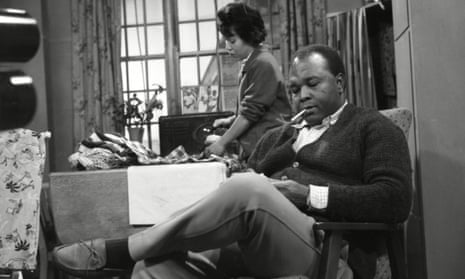Like so many African-Caribbean actors of his generation, Thomas Baptiste, who has died aged 89, straddled two career horses, of token casting and radical breakthrough, and invested both streams of work with pride and dignity.
He appeared on TV in the Dick Emery Show and as a doctor when Warren Mitchell’s Alf Garnett in Till Death Us Do Part turned up for treatment after initiating a racist punch-up at a football match. But he also played for two years in Noël Coward’s Nude With Violin (1956) – in Dublin and then the West End – with John Gielgud, Patience Collier and Kathleen Harrison.
In the 1960s he subversively, and prophetically, occupied roles such as the dustman Doolittle in Shaw’s Pygmalion and, at the Connaught in Worthing, Edward Albee’s benighted academic George opposite Isabelle Lucas’s black Martha in Who’s Afraid of Virginia Woolf.
More obviously, he could play Shakespearean roles such as Orsino in Twelfth Night, Caliban in The Tempest, the Prince of Morocco in The Merchant of Venice, and Othello. He had great success in Eugene O’Neill’s The Emperor Jones as a deranged African despot at the shortlived Dark and Light theatre in Brixton in 1973, and on film he imposingly embraced the outer lineaments of a pipe-smoking secret agent in The Ipcress File (1965), a corrupt African military dictator in The Wild Geese (1978) and the operating surgeon engulfed in a coup against Milton Obote in The Rise and Fall of Idi Amin (1981).
Baptiste was born in Georgetown in British Guiana (now Guyana), one of the many children of a wealthy landowner who rented parts of his estate to tenant farmers. He was not close to his father, but at the age of 21 persuaded him to allow him to leave for Britain to study agriculture. On arrival in 1950 in London, where his mother, Pearl, joined him later, he promptly took a factory job, enrolled at Morley College to study the rudiments of music and began mixing with artistic types.
Thanks to Baptiste’s social graces and good looks, allied to a chance encounter with Tom Driberg, the gadfly journalist and Labour MP, he was swept into the salon cultural life of London, consorting with Driberg’s chums about town, who included Nye Bevan, Jennie Lee and Joan Littlewood. He also maintained a close friendship with the designer Oliver Messel and a place at the centre of Princess Margaret’s Mustique “set” in the Caribbean.
Like his hero, Paul Robeson, Baptiste started his professional life as a baritone singer. Eventually he joined Littlewood’s Theatre Workshop and lived communally with the company in Edinburgh before it found its creative home at the Theatre Royal in Stratford, east London.
During that time he entered the Richard Tauber international singers’ competition, came third, got noticed and studied with Joan Cross.
He won a scholarship to the Royal Academy of Music, London, but sensing little opportunity for black baritones in the opera world as then constituted, plumped for a dramatic role in Eric Maschwitz’s Summer Song (1956), based on Dvořák’s composition of the New World symphony, starring Sally Ann Howes and Edric Connor. After Nude with Violin it was mainly drama, but he maintained his singing career while moving more certainly into theatre and television.
In the early 60s he co-founded an African-Asian committee of the actors’ union Equity; in 1992, however, he said that black actors in Britain found more difficulty beginning their careers than he had 40 years previously.
Baptiste was in O’Neill’s The Iceman Cometh at the Bristol Old Vic, then Harold Pinter invited him to join the first professional production of his first play, The Room, in 1960, at Hampstead theatre club. He played Riley, the blind black man who lurks in the basement, a messianic figure who gets beaten up for his pains. When the play transferred to the Royal Court on a double-bill with another short Pinter, The Dumb Waiter, Michael Caine joined the cast – five years before he worked with Baptiste again on The Ipcress File.
In 1963 Baptiste became the first black character in Coronation Street, appearing in several episodes as a bus conductor, Johnny Alexander, who was sacked as a result of a racist altercation with Len Fairclough (Peter Adamson).
Several important BBC plays also marked his television career: John Hopkins’ Fable (1965) prompted Baptiste to play a Nelson Mandela figure in a fantasy totalitarian state with the white population as social underdogs; Alun Owen’s Pal (1971) paired him with Robin Phillips to play across the racial prejudice divide; and in Barrie Keeffe’s King (1984), the celebrations of his Lear-like potentate on returning home did not quite go to plan.
Other screen highlights included a notable cameo in John Schlesinger’s Sunday Bloody Sunday (1971) with Glenda Jackson, and appearances in many of the 15 episodes of Empire Road (1978), the first all-black TV soap. In 1978, on stage, at the Birmingham Rep and the Mayfair in London, he played Robeson, in Are You Now or Have You Ever Been, Eric Bentley’s dramatised transcript of the McCarthy hearings of 1950.
Baptiste led a life rich in friends and colleagues (and he had 14 godchildren), enjoying his longest and closest relationship with Francis Rutland, a solicitor, who died in the 90s.
From that decade onwards he had a home in St Lucia in the Caribbean, but he spent the last 10 years of his life in Hove, East Sussex.

Comments (…)
Sign in or create your Guardian account to join the discussion